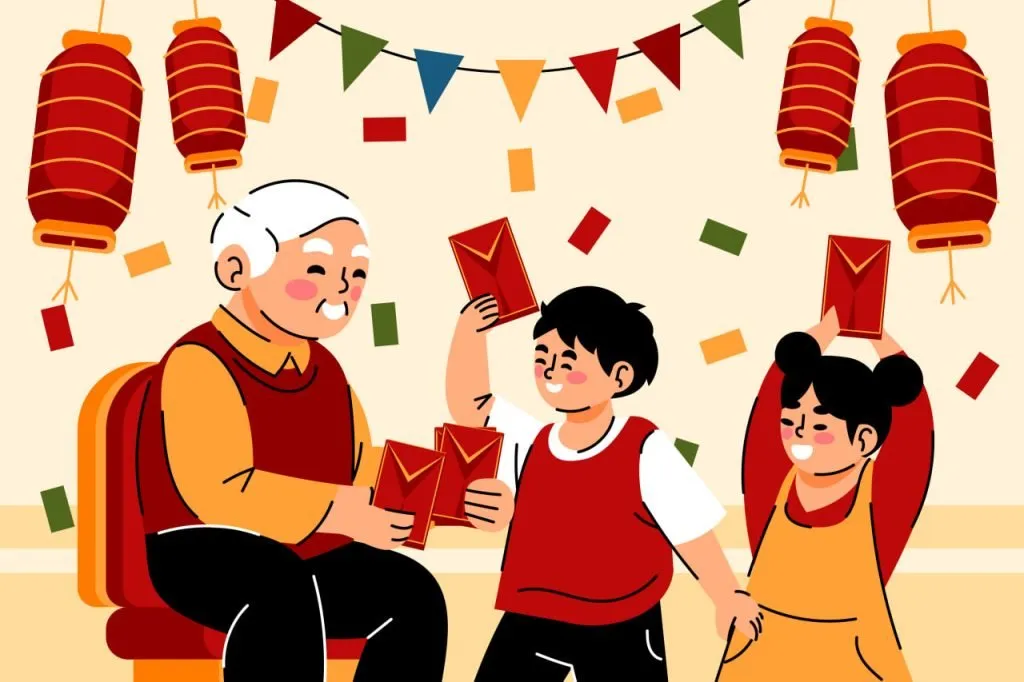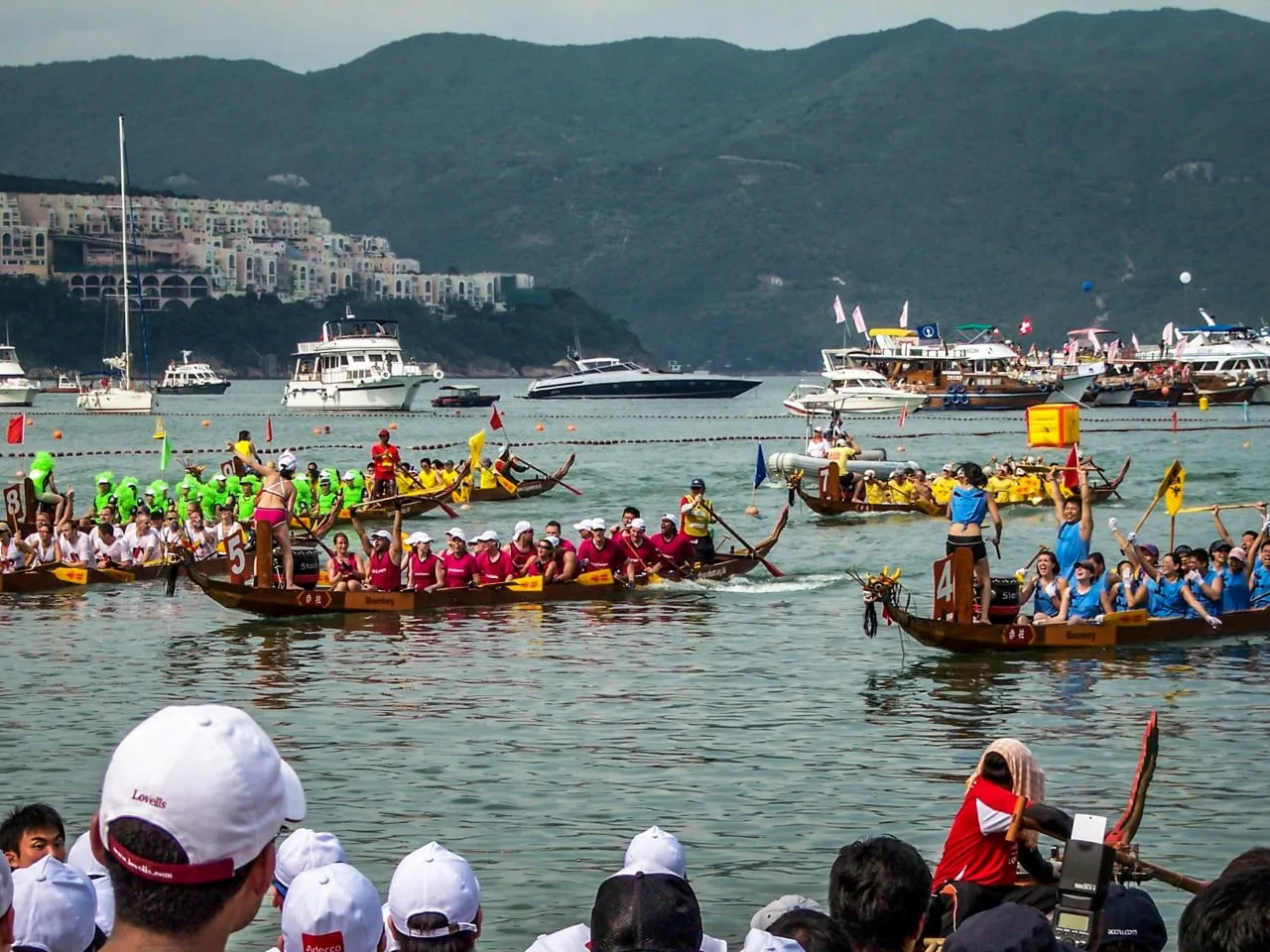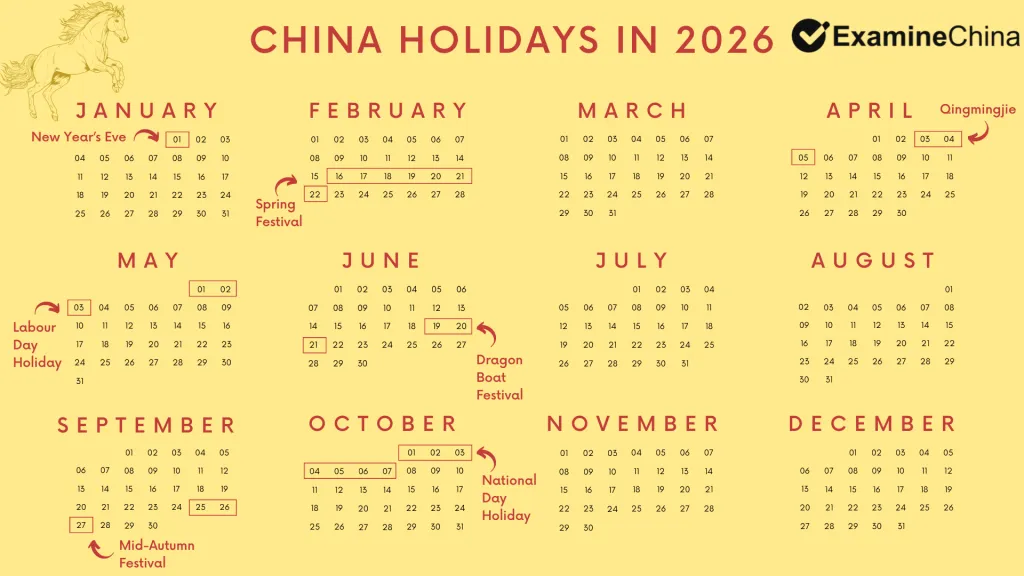In China, holidays provide a great opportunity for returning to one’s hometown and spending time with family. Chinese people focus on celebrating these occasions, and often, these days are designated as statutory holidays. To determine the dates of holidays, Chinese people mostly use the lunar calendar, which is different from the common Gregorian calendar. In the following article, we describe the holidays in China in 2026, taking into account their impact on business affairs.
Holidays in China 2026
Chinese New Year 2026
- Date: February 17, 2026
- Days off: February 16 – 22, 2026
The Chinese New Year, also known as the Spring Festival, is the most important holiday in Chinese culture. It lasts for 7 days, but the holiday period extends for two additional weeks, until the Lantern Festival, which in 2026 falls on March 3rd. Each year in the Chinese calendar is associated with a sign of the Chinese zodiac. In 2024, it is the Year of the Dragon; in 2025, it will be the Year of the Rat; and in 2026, it will be the Year of the Horse.
The Chinese New Year is a time for spending time with family and returning to one’s hometown. Traditionally, Chinese people spend it having a reunion dinner with family, giving younger family members red envelopes with money, decorating their homes with red decorations, and watching the New Year’s gala on TV. Firework shows and dragon dances are also organized.

Tomb-Sweeping Day 2026
- Date: April 5, 2026
- Days off: April 3 – 5, 2026
The Chinese Tomb-Sweeping Day, also known as Qingming Festival (Pure Brightness Festival), is a holiday aimed at paying homage to ancestors. Chinese people return to their hometowns, and the main tradition of this day is visiting and cleaning the graves of the deceased. Incense sticks are burned at the graves, offerings of food are made, and special paper money is burned. To show respect to ancestors, each family member also bows, touching their forehead to the ground three times. It is also a time for walks and spending time with loved ones in the fresh spring air.

Labor Day 2026
- Date: May 1, 2026
- Days off: May 1 – 5, 2026 / May 1 – 3, 2026
Chinese Labor Day was introduced in China after the proclamation of the People’s Republic of China as a holiday for the working class. During this time, companies remain closed, sometimes even for a week. There are no specific traditions associated with this holiday, and it is determined using the Gregorian calendar, not the lunar calendar.
Chinese people spend this time resting and meeting with family or friends. It is also an opportunity to travel within the country; roads are crowded with cars, trains, and planes are filled to capacity with travelers, and tourist attractions limit the daily number of visitors.
Dragon Boat Festival 2026
- Date: June 19, 2026
- Days off: June 19 – 21, 2026
The Dragon Boat Festival, also known as the Double Fifth Festival, takes place on the 5th day of the 5th month of the lunar calendar. Traditionally, the origins of the festival date back to the period of the Warring States (475–221 BCE) and are associated with the tragic death of the poet and scholar Qu Yuan. He was falsely accused and exiled from the state by hostile officials, and out of despair, he threw himself into the Miluo River. The local residents set out on boats in search of his body, but the mission was unsuccessful. Wanting to protect the poet’s body from being eaten by the fish that inhabited the river, the locals fed it zòngzi, sticky rice with additives wrapped in bamboo leaves.
To this day, the Chinese eat zòngzi on this day, and dragon boat races are organized in many places.

Mid-Autumn Festival 2026
- Date: September 25, 2026
- Days off: September 25 – 27, 2026
The Mid-Autumn Festival traditionally commemorates the story of the goddess Chang’e, the wife of the mythical archer Hou Yi, who shot down nine suns, leaving one and thereby saving humanity from death.
According to legend, Chang’e was supposed to drink the elixir of immortality, which her husband had received for his merits. Unexpectedly, she began to rise into the sky until she reached the moon, where she was to remain forever. When Hou Yi learned what had happened, he prepared a table with delicacies and fruits in the garden and then continuously gazed at the Moon, thinking about how to reunite with his beloved. Another important element associated with the festival is the white rabbit, the companion of Chang’e and a symbol of longevity.
The festival is a time for family gatherings, shared meals, and admiring the full moon. Traditional food associated with the festival is mooncake (yuèbĭng), filled most commonly with red bean paste.

National Day of the People’s Republic of China – Golden Week 2026
- Date: October 1, 2026
- Days off: October 1 – 7, 2026
The National Day, which marks the beginning of the so-called Golden Week, always falls on October 1st of the Gregorian calendar and is not a movable holiday. It commemorates the Communist Party of China’s victory in the civil war and the proclamation of the People’s Republic of China by Mao Zedong in 1949. It is a very good opportunity for Chinese people to return to their hometowns or travel around the country. Therefore, it is a period of increased tourist movement, and shops, malls, hotels, and restaurants experience the highest revenues of the year in a short period of time.
Chinese holidays and days off, and business affairs

It’s important to remember that holidays and days off for Chinese people are primarily a time for relaxation and spending time with family. During these periods, companies, offices, and factories either suspend their operations or significantly reduce the number of employees. Contact with Chinese contractors may be difficult during this time.
If you source from China, place orders for products and book shipping containers in advance. In addition to delayed deliveries, there might be issues with product quality due to accelerated production just before the holiday season.
We also do not recommend business travel during holiday periods, as there is mass population movement and difficulties accessing transportation. It’s important to respect Chinese holidays and plan business matters for another time.
Main graphic: explorica.ca/blog/facts-chinese-year
